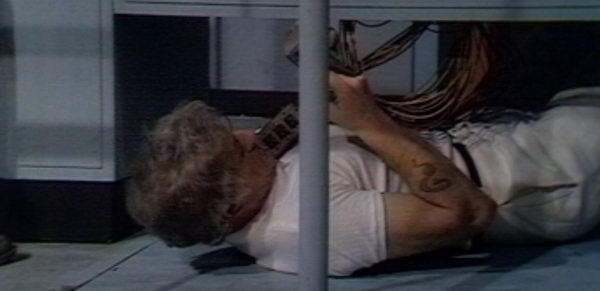|
| |
|
STORY PLACEMENT THIS STORY TAKES PLACE BETWEEN THE NOVELS "WAR OF THE DALEKS" AND "KURSAAL."
WRITTEN BY LAWRENCE MILES
RECOMMENDED PURCHASE OFFICIAL BBC 'EIGHTH DOCTOR' PAPERBACK (ISBN 0-563-40577-5) RELEASED IN NOVEMBER 1997.
BLURB On an island in the East Indies, in a lost city buried deep in the rainforest, agents of the most formidable powers in the galaxy are gathering. They have been invited there to bid for what could turn out to be the deadliest weapon
ever created. Sam arrive in the city, the Time Lord soon realises they've walked into the MOST BIZARRE auction in history - and what's on sale to the highest bidder is something more horrifying than even the Doctor could have imagined.
seems things can't get any worse, the Doctor finds out who else is on the guest list. |
|
|
Alien Bodies NOVEMBER 1997
Alien Bodies by Lawrence Miles has been hailed by some as “the single most imp- ortant Doctor Who book ever” and, whilst it’s difficult to agree entirely with such sweeping sentiments, it isn’t at all difficult to see why this book turned the Whoniverse upside down and inside out when it was released in 1997.
At a first glance, it’s hard to believe that Alien Bodies was borne of the same mind that produced Christmas on a Rational Planet. Miles’ 1996 New Adventure was utterly bizarre; 280 pages of sheer bafflement. Alien Bodies, conversely, makes a lot of sense despite the inherent complexity of the issues that Miles deals with. Yet if one looks closely at the ideas behind both books, there is certainly something to be found in both that is inimitably Miles; the difference is simply that Alien Bodies is a much more refined and much more polished product than Christmas on a Rational Planet was.
And although this novel lacks as ornate a title as its predecessor, it more than makes up for its bland billing with its first-class story. In a nutshell, Alien Bodies concerns the sale of the Doctor’s corpse. You’ve got it – at some point in his personal future the Doctor dies, and when he does Mr Qixotl takes the corpse, with its unique “biodata”, and offers it up for sale to the highest bidder. Everyone from the Daleks to the Krotons want to get their grubby little protuberances on ‘the Relic’, believing it to be the ultimate weapon. A good start, don’t you think? Well here is where it gets really interesting.
“And this is the thing that doesn’t make sense to me. They could see the whole of the universe through the aperture, they could have watched any event from the beginning of time to the end. So, how could they not know the outcome of the war?”
The laws of time, be they a code of conduct or an immutable physical truth (the jury is still out on that one, and probably always will be), have always blinkered both the Doctor and his people. Many of the Virgin novels made explicit what the classic series often implied – that the Time Lords are blind to their own future, and that they certainly cannot go there. After a certain date, TARDISes simply cannot enter Gallifreyan space. For all their power, they are, for want of a better phrase, time locked. And in Alien Bodies, Miles tells of a war that will ravage the whole of creation – not the Last Great Time War of the new series, but some-thing equally calamitous. The Time Lords will be pitted against an unknown and obscenely powerful enemy, and they can’t foresee the outcome. Locked in a temporal stalemate, these Time Lords believe that the Doctor’s biodata could be their only salvation, and so they send the Time Lord Homunculette and Marie, his state-of-the-art living TARDIS, to the auction in the East Indies to get their hands on the Doctor’s cadaver.
stop there. Not content to offer us what feels like illicit insight into the Time Lords’ future, he shows us what might ultimately become of their wholly nefarious Celestial Intervention Agency. They will create Mictlan - their own mini-universe, a Matrix of sorts - and exist within it as the Celestis, non-corporeal beings of superlative power who aren’t fettered by the Time Lords’ strict policies of non-interference. We even get to see a future Doctor arrive there; one who appears every bit as imposing as the one described by River Song in Silence in the Library. I wonder…
Most interesting of all though are Faction Paradox who, like just about every other party in this novel, want the Doctor’s body for their own less than benign purposes. Miles describes this meddling Time Lord splinter group as a “time travelling voodoo cult from the future”; an interesting hook (to say the least), but there is far more to these guys than that. One of the chapters in this novel is entitled “Continuity Bomb”, a title that could quite easily be applied to this whole novel as the implications of who Faction Paradox are and what they do are completely mind blowing. Simply put, they get off on altering history. They thrive on Paradox. And they certainly have no love lost for their estranged Time Lord cousins. Their leader, the ingeniously named Grandfather Paradox (of the House of Lungbarrow, if I’m remembering Christmas on a Rational Planet correctly), went so far as to cut off one of his arms to rid himself of the tattoo that the Time Lords’ gave him to brand him as a renegade.
Above: The third Doctor’s cobra tattoo. A renegade branding? However, within this novel at least, the Faction do feel slightly wasted. They are far and away the most appealing component that Miles has thrown into the mix, yet he keeps them on the fringes, teasing us with them rather than giving them a more active role. Nevertheless, Miles does still go off on some very interesting tangents with them. Not only do the Faction serve as a catch-all explanation for those continuity errors that we Doctor Who buffs so love to spot, reconciling these BBC Books with the Virgin New Adventures that preceded them, but they also create deliberate continuity errors that Miles uses to fuel further intrigue. Take the Doctor’s present companion, Samantha Jones, for example. On the face of it she’s a rather generic companion – too generic for many people’s tastes – but here Miles reveals that the Sam we know is not the Sam that ‘should’ exist. Her timeline has been altered. Samantha Jones should have been a dark-haired, down and out, drug-user. But, for reasons yet to be explained, she is the Doctor’s ideal companion.
“I’m half stupid, on my mother’s side”.
Very much in the same vein as Marc Platt’s seminal novel Lungbarrow, Alien Bodies tends to raise more questions than it answers, rendering the Doctor perhaps more of a mystery now than ever. But what really sets Alien Bodies apart is that rather than speculate about the Doctor’s past, it shows us his future. Hell, it shows us his end. The novel ends with the eighth Doctor disposing of his own corpse on the abandoned planet of Quiescia without any sort of fanfare or uproar. It ends with a whisper.
Altogether
then, Alien Bodies is every bit as unmissable as Lungbarrow
was, marking yet another pivotal cornerstone in
Doctor Who
mythology. More than that though, Alien Bodies is a great novel in
its own right and, despite the dark and bewildering subject matter, at
times it is actually tremendous fun. If the Doctor’s final death and a
brewing War in Heaven aren’t enough to win you over, then E-Kobalt the
Dalek-crunching Kroton surely will be.
|
|
|
Copyright © E.G. Wolverson 2010
E.G. Wolverson has asserted his right under the Copyright, Designs and Patents Act, 1988 to be identified as the author of this work. |
|
|
This story posits that when he eventually dies, the Doctor’s eighth self will quietly bury his final incarnation’s corpse on the planet Quiescia.
Alien Bodies is also the first story to explore “biodata” - essentially the information that defines a person’s history - which will become of the utmost import in both Unnatural History and Interference. It is the Doctor’s biodata that makes his corpse such a valuable commodity in this story.
|
|
|
Unless otherwise stated, all images on this site are copyrighted to the BBC and are used solely for promotional purposes. ‘Doctor Who’ is copyright © by the BBC. No copyright infringement is intended. |
|

.jpg)
.jpg)

 Believe it or
not, Miles doesn’t
Believe it or
not, Miles doesn’t 